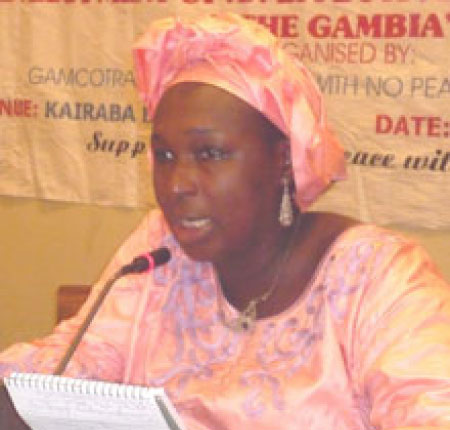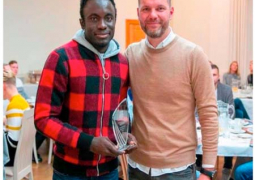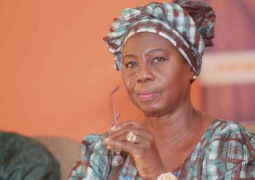
The delegation of the European Union to The Gambia on March 8 celebrated International Women’s Day at the AllianceFranco Gambiene.
In her statement to mark the day, Madam Agnès Guillaud, EU Chargé d’Affaires, said the day was first celebrated in 1911, over 100 years ago.
The she explained, also provides an important occasion to pay tribute to the economic, social, political and cultural achievements of women, as well as to reflect on the inequalities that still need to be addressed.
“The EU has a long-term political commitment to promoting women’s rights and gender equality, which is seen as a fundamental EU principle,” she said. “We put women’s rights at the heart of everything we do, because we recognise the vital contribution that women make to national development and achieving peace and security, and the fact that, ultimately, no nation can prosper when the rights of half of its population are oppressed.”
She noted that The Gambia also offers lessons for other countries in Africa. “Women are represented at the highest political level here, and Her Excellency the Vice President and Minister for Women’s Affairs is not only the first woman to control this office in The Gambia, but also the only woman to date to have achieved such height in the entire sub-region.”
Notwithstanding, she noted, important challenges still remain to enhancing women’s engagement and empowering them, both here in The Gambia and globally.
“Women and girls constitute the majority of the world’s poorest, subsisting on less than US$1 a day. Aside from their low political representation, they also have less access to labour and financial markets, and are paid significantly less than men,” she remarked.
“Perhaps most worryingly, violence against women is still widespread - thousands of women and girls are victims of gender-based violence every single day, in the form of sexual abuse, trafficking or early and forced marriage.
“Sadly, The Gambia is no exception - violence against women remains in this country, where up to 80% of girls are submitted to the practice of female genital mutilation - a violation of their integrity.
“I am extremely pleased that Amie Bojang-Sissoho from GAMCOTRAP will be a guest speaker this evening as her organization is carrying out vital work in this field through their successful ‘Drop The Knife’ campaign, which has led communities to understand the health risks associated with FGM.”
According to her, discrimination and violence against women are the issues that the EU strives to address in our cooperation with our partner countries, including The Gambia.
“The EU places particular emphasis on education for girls, because we believe that it is education that provides the key to equipping women to become independent, defend their rights, report violence, and participate in the political and economic processes of their country,” she said, adding that educated women and girls are a major asset to spur economic growth, and also to improve health status in a country.
“It is therefore encouraging that the importance of girls’ education in The Gambia is recognised, although further progress is still needed.”
In a statement she delivered on behalf of Vice-President Isatou Njie-Saidy, deputy Permanent Secretary Office of the Vice President Amie Njie noted that it is important to take stock of the economic, political and social achievements of women as well as to reflect on the challenges encountered in the promotion of gender equity, equality and the empowerment of women and girls at all levels as the day is marked.
She indicated that the theme, “Connecting girls inspiring futures”, is very important as it calls for involving, educating and inspiring girls from all walks of life to reach their full potential among others.
“The Government of The Gambia in recognition of the importance of investing in young people, has established institutional and policy frameworks to address their needs, particularly girls,” she remarked.
She highlighted that a lot of investment has gone into girl’s education culminating in the achievement of gender parity, at basic level as well as increase in the enrolment of girls at the secondary and tertiary levels, among others.
According to her, the government enactment of the 2012 Women’s Act is a significant milestone to promoting and protecting women’s right.
For her part, Amie Bojang-Sissoho of Gamcotrap saluted the Gambia government for observing the day.
“The context of women’s rights starts with the rights of the girl-child and it is the responsibility of the State to protect the rights of its entire citizenry and in this case the rights of women and children from FGM,” she said.
Mass consciousness has increased about the negative impact of FGM on the sexual and reproductive health rights of women and children, Mrs Bojang-Sissoho.
According to the rights activist: “GAMCOTRAP takes the cluster approach in which communities who share cultural ties with the same circumcisers are brought together to reach consensus to protect their girl-children.”
She added that the approach made it possible for representative from 564 communities in three regions to support their circumcisers to stop the practice of FGM.
FGM, she noted, should be specific; just like how early and forced marriage or rape has been clearly mentioned in the laws of The Gambia.
“Not mentioning FGM underrates its importance in our development agenda,” she argues, emphasising the need for the government to ensure that laws and policies calling for a ban to FGM are enacted and included in The Gambia’s constitution.
The event, which ended with a film screening on FGM, was attended by several dignitaries and activists.
Read Other Articles In Article (Archive)



